
Del arte erudito al popular, del humor común al intelectual, no hay límites, es sólo la creación del éxito o del fracaso. Un artista popular con humor es el brasileño Zé Andrade que, como camino creativo, pasó por la prensa, la escenografía carnavalesca, pero cuya obra principal es la escultura caricaturesca en cerámica.
OMS - Zé, ¿qué sabes sobre los orígenes del humor brasileño?
Zé Andrade - «Sabes, nuestra cultura indígena es muy lúdica, siempre está jugando y jugando (mental y físicamente). Es algo muy serio para ellos, porque es importante. Curiosamente, no recuerdo a ningún brasileño “puro” que se haya destacado en este ámbito. Los indígenas brasileños que conozco son muy tímidos y distantes. Han sido maltratados por la sociedad, quizás la razón de esta distancia y de que sean muy reservados. La personalidad brasileña se compone, por tanto, de tres elementos: el blanco/latino más solemne y enfático que humorístico; el indio, un ser juguetón pero deprimido; el negro descendiente de esclavos, mucho más juguetón, que ríe, canta, baila y hace el carnaval de la vida. El humor brasileño es muy diverso y cada estado tiene su propio tipo de comedia, es decir, la de Río es diferente a la de São Paulo, Bahía, etc. Los estados más especiales en términos de humor son Piaui (que tiene una gran Sala del Humor, pero São Paulo también tiene Piracicaba - el más antiguo de Brasil, sin olvidar Pernambuco, Caratinga - Minas Gerais, Manaus...) y el Estado de Ceará, donde grandes Nacieron comediantes de cine teatro como Chico Anísio, Renato Aragão…
OMS - ¿Qué caracteriza el humor brasileño?
Zé Andrade - «Esencialmente el sentimiento de pérdida y de superación».
OMS - ¿Es el Carnaval lo que mejor define el humor brasileño?
Zé Andrade - «El carnaval es muy importante en Brasil. Cuando llegué a Río, el Carnaval era diferente, más animado, más artesanal... João Trinta, que venía del Teatro Municipal, le dio un alma nueva, lo transformó en la gran ópera de la calle. Trabajé con él, con Renato Laje, trabajé mucho (principalmente en la Escola Beija Flor)… Hoy es mucho más tecnológico, hay escultura, pero ha perdido su encanto, los artistas han pasado a un segundo plano… Pero lo más importante aquí es la presencia negra, tu alegría, tu humor… que es fundamental y sagrado; Son los «Viejos compositores», «As Velhas Baianas»… Hoy ya no trabajo para los carnavales».
OMS - Eres conocido sobre todo por tus “Memory Pills”, estas pequeñas esculturas caricaturescas de personalidades de la sociedad brasileña, pero también haces caricaturas gigantes:
Zé Andrade - «Lo hago porque los propios políticos me encargan sus máscaras (estilo gigante), para hacer campaña con ellos, enviando delegados con su máscara (la imagen como identificación de las ideas políticas expresadas) que viajan por todo el país. país. Estas son las máscaras que retratan a la persona, de la que, cuando llega a la calle, todo el mundo se ríe, como expresión de cariño y cariño».
OMS -Viniste del interior de Brasil y te adaptaste al arte urbano carioca, pero en el fondo siempre mantuviste el alma de artesano.
Zé Andrade - «Soy un creador de arte popular. Soy un artista intuitivo, que utiliza mi fuerza creativa y mis sentimientos. Creo lo que me toca, me conmueve, me sorprende. El artista es alguien que permanece embarazada de lo que hace, sin soltarse nunca, investigando, buscando y creando.
Lo importante es cómo lo voy a solucionar, cómo voy a cruzar el río, el océano... hasta quedar satisfecho con el resultado final. De esta forma surgieron más de un centenar de personalidades caricaturizadas, como «Memory Pills».
«Para conocer qué es el humor en Brasil, les recomiendo ver las películas “Reír por nada – Humor sin límites” y “Tá Rindo de Quê?” interpretada por el trío Claudio Maciel, Álvaro Campos y Alê Braga».
LO QUE VALE LA CARNE – Carne Vale
Por: Osvaldo Macedo de Sousa
«Era el tumulto del Carnaval... gusto y apetito depravados, intemperancia de la gula, en fin, carne.» Padre António Vieira en «Sermones»
Debajo de la máscara está la carne, materia putrefacta que el tiempo destruye hasta convertirla en nada. Nada muere, todo se transforma, y antes de que llegue el tiempo de la resurrección al tercer día, hay tres días “gordos” de glotonería, que preceden a la marca de las cenizas: “Acuérdate, hombre, que polvo eres, y en polvo te convertirás. ".
Debajo de la máscara de la riqueza están Zé y Maria Povinho, materia en degradación que los impuestos están destruyendo, hasta quedar en los huesos, que la carne es cara. Nada muere, algunos se dan la vuelta, y antes de que llegue el momento de la revuelta general, el político
celebra elecciones, renaciendo, como un «fénix», de las cenizas gubernamentales: «- Oh Zé, ¿no me conoces?» - pregunta la máscara política - «¡Sé que te gustan mis dedos! Eres el mismo que el año
pasado, pero con otra cara... Aparte de eso, no haces ninguna diferencia: la misma portada, la misma redacción y las mismas aportaciones”. (R.B.P. en «Pontos nos ii» del 3/4/1886).
La máscara es el arma del político, y con ella da libertad de fantasía al interlocutor, con ella se metamorfosea en lo que a los demás les gustaría ver, finge ser lo que a él le gustaría parecer. La máscara es Carnaval, es «Xexé», es «Salsa», es política disfrazada de vida.
Como el ciclo anual, cuando la vida parece morir, ante la falta de esperanza, cuando los fríos inviernos aprietan la máscara sobre el hielo, llegan las campañas electorales, llega el carnaval, la fiesta de la carne. Ya no hay “cordero con patatas”, y la carne en la “asada” es otra: “¡Ahora miren muchachos, cómo cambian los tiempos!... Antes, cuando había fe y religión en el mundo, era el Pueblo que quemó al Judas... Hoy, es el Judas quien quema al Pueblo». (Nogueira, en «Os Pontos», el 4/2/1899).
La Fiesta es la tradición del «apetito depravado», de la «intemperancia de la gula», es la barriga en busca del «guiso a la portuguesa», que tiene más patatas y coles para unos que para otros. Pero también es libertad en apariencia, es dejar caer las máscaras de conveniencia con las que nos escondemos de nosotros mismos, como una ilusión para engañar a los demás, y todos hemos sido engañados.
El carnaval, como valor de la carne grasa, pues la carne limpia de vaca es muy cara, es el enmascarado que se desenmascara, sin necesidad del espejo mágico del caricaturista.
Tres días de carnaval, días de exorcismo, tres “días gordos” en un intento de olvidar la grasa de la carne más barata, o la “solía” de la “nuez política”. Si Carnaval es el triunfo de la carne, porque no tiene IVA, y la Cuaresma es el tiempo de la abstinencia, de los servicios prestados con IVA, Portugal es para Zé la abstinencia perpetua y la carne eterna del político.
Días de juerga personificada por un ser holgazán y glotón, capaz de todos los excesos y travesuras, a modo de triunfo liberador. El carnaval y su orgía es una irreverencia contra la normalidad, es una pequeña explosión dentro de un año entero en el que Zé y María bailan, bailan... en una eterna mascarada. Bueno, cuando creen que finalmente pueden pagar los huevos podridos, ¡les llega la Cuaresma! De la boca salen los pecados, (...) (en este espacio se escribía bacalao)... de la boca, procesiones, cera gastada, mirra, sermones, traje negro... ¡y estás en el cielo! » (Almeida e Silva, en «Charivari», (18/2/1888).
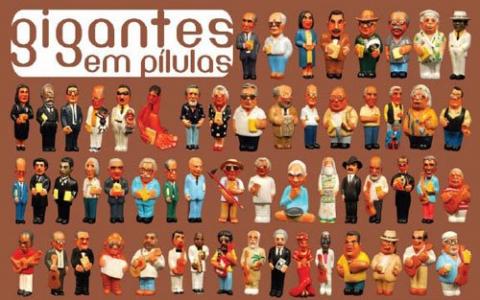


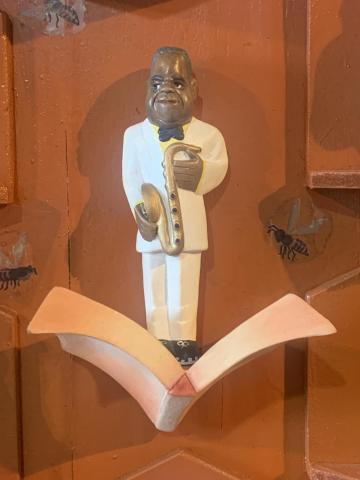
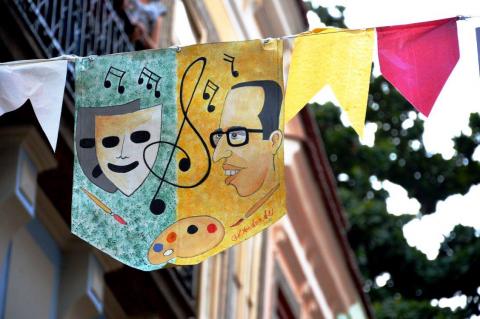
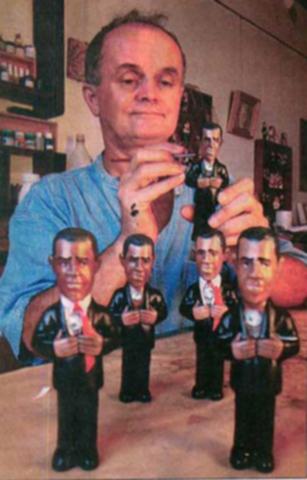
Zé Andrade

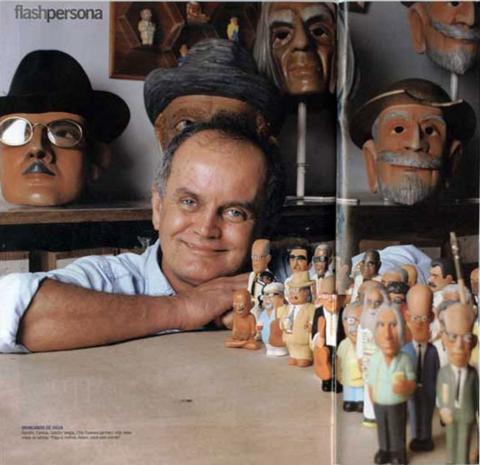
Zé Andrade
Humors of the World – Brazil (Zé Andrade)
By: Osvaldo Macedo de Sousa
From erudite to popular art, from common to intellectual humor, there is no boundary, it is just the creation of success or failure. A popular artist with humor is the Brazilian Zé Andrade who, as a creative path, went through the press, carnival scenography, but whose main work is caricatural ceramic sculpture.
O.M.S. - Zé, what do you know about Brazilian humorous origins?
Zé Andrade - «You know, our indigenous culture is very playful, it is always playing and playing (mentally and physically). I´s something very serious for them, because important.
Interestingly, I can´t remember any “pure” Brazilian who stood out in this area. The indigenous Brazilians I know are very shy and distant. They have been mistreated by society, perhaps the reason for this distance and why they are very reserved. The Brazilian personality is, therefore, made up of three elements: the white/Latino more solemn and emphatic than humorous; the Indian, a playful but depressed being; the black descendant of slaves, much more playful, who laughs, sings, dances and makes the carnival of life. Brazilian humor is very diverse and each state
has its own type of comedy, that is, Rio´;s is different from São Paulo´;s, Bahia´;s, etc. The most special states in terms of humor are Piaui (which has a large Humor Hall, but São Paulo also has Piracicaba - the oldest in Brazil, not forgetting Pernambuco, Caratinga – Minas Gerais, Manaus …) and the State of Ceará, where great comedians of cinema theater such as Chico Anísio, Renato Aragão were born…
O.M.S. - What characterizes Brazilian humor?
Zé Andrade - «Essentially the feeling of loss and overcoming».
O.M.S. - Is Carnival what best defines Brazilian humor?
Zé Andrade - «Carnival is very important in Brazil. When I arrived in Rio, Carnival was different, it was more lively, more artisanal... João Trinta, who came from Teatro Municipal, gave it a new soul, transformed it into the great opera of the street. I worked with him, with Renato Laje, I did a lot of work (mainly at Escola Beija Flor)… Today it is much more technological, there is sculpture, but it has lost its charm, the artists have moved into the background… But the most important thing here is the black presence , your joy, your humor… which is fundamental and sacred; They are the «Old composers», «As Velhas Baianas»… Today I no longer work for carnivals».
O.M.S. - You are known especially for your “Memory Pills”, these small caricatural sculptures of personalities from Brazilian society, but you also make giant caricatures:
Zé Andrade - «I do it, because the politicians themselves order their masks from me (giantone style), so they can campaign with them, sending delegates with their mask (the image as an identification of the political ideas expressed) who travel throughout the country. These are the masks that portray the person, which, when they arrive on the street, everyone laughs at, as an expression of affection and affection».
O.M.S. - You came from the interior of Brazil and adapted to the urban art of Rio, but deep down you always maintained the soul of an artisan.
Zé Andrade - «I am a creator of popular art. I am an intuitive artist, using my creative strength and my feelings. I create what touches me, moves me, amazes me. The artist is someone who remains pregnant with what they are doing, never letting go, investigating, searching and creating. The important thing is how I´;m going to solve it, how I´;m going to cross the river, the ocean... until I´;m satisfied with the final result. In this way, more than a hundred caricatured personalities emerged, such as «Memory Pills».
«To get to know what humor is in Brazil, I recommend you watch the films “Laughing for nothing – Humor without Limits” and “Tá Rindo de Quê?” performed by the trio Claudio Maciel, Álvaro Campos and Alê Braga».
Carnival
By: Osvaldo Macedo de Sousa
«It was the tumult of Carnival... depraved taste and appetite, intemperance of gluttony, in short, meat.» Father António Vieira in «Sermons»
Underneath the mask is the flesh, putrefying matter that time destroys until it becomes nothing. Nothing dies, everything is transformed, and before the time of resurrection arrives on the third day, there are three “fat” days of gluttony, preceding the mark of ashes: “Remember, man, you are dust, and to dust you will become."
Beneath the mask of wealth are Zé and Maria Povinho, matter in degradation that taxes are destroying, until it remains in the bone, that the meat is expensive. Nothing dies, some turn their coats around, and before the time of general revolt arrives, the politician holds elections, being reborn, like a «phaenix», from the governmental ashes: «- Oh Zé, don't you know me?» - asks the political mask - «I know you like my fingers! You´;re the same as last year, but with a different face...
Other than that, you don't make any difference: the same cover, the same wording, and the same contributions.” (R.B.P. in «Pontos nos ii» on 4/3/1886).
The mask is the politician's weapon, and with it he gives freedom of fantasy to the interlocutor, with it he metamorphoses into what others would like to see, he pretends to be what he would like to appear like. The mask is Carnival, it is «Xexé», it is «Salsa», it is politics disguised in life.
Just like the annual cycle, when life seems to die, in the lack of hope, when the cold winters tighten the mask on the ice, the election campaigns arrive, Shrovetide arrives, the festival of meat.
There is no longer “mutton and potatoes”, and the meat on the “barbecue” is different: “Now, look, boys, how times change!... Before, when there was faith and religion in the world, it was the People who burned the Judas... Today, it is the Judas who burn the People». (Nogueira, in «Os Pontos», on 2/4/1899).
The Festival is the tradition of «depraved appetite», of «intemperance of gluttony», it is the belly in search of «Portuguese-style stew», which has more potatoes and cabbage for some than for others. But it is also freedom in pretense, it is the dropping of the masks of convenience in which we hide from ourselves, as an illusion of deceiving others, and we have all been deceived.
Carnival, as the value of fatty meat, since clean cow meat is very expensive, is the masked person who unmasks himself, without the need for the caricaturist's magic mirror.
Three days of Shrovetide, days of exorcism, three “fat days” in an attempt to forget the fat of the cheapest meat, or the “tapeworm” in the “politics nut”. If Shrovetide is the triumph of the flesh, because it does not have VAT, and Lent is the time of abstinence, of services provided with VAT, Portugal is perpetual abstinence for Zé, and the eternal flesh of the politician.
Days of revelry personified by a lazy and gluttonous being, capable of all excesses and mischief, as a liberating triumph. Carnival and its orgy is irreverence against normality, it is a small explosion within a whole year in which Zé and Maria are danced, danced... in an eternal masquerade. Well, when they believe they can finally repay the bad eggs, Lent hits them! Sins out of the mouth, (...) (in this space it was written cod)... out of the mouth, processions, spent wax, myrrh, sermons, little black suit... and you are in heaven! » (Almeida e Silva, in «Charivari», (2/18/1888).
